
This parent guide supports parents in helping their child at home with the 8th grade Social Studies content.
- Subject:
- Social Studies
- Material Type:
- Reference Material
- Vocabulary
- Author:
- Kelly Rawlston
- Letoria Lewis
- Date Added:
- 10/12/2022

This parent guide supports parents in helping their child at home with the 8th grade Social Studies content.

This resource accompanies our Rethink 8th Grade Social Studies course. It includes ideas for use, ways to support exceptional children, ways to extend learning, digital resources and tools, tips for supporting English Language Learners and students with visual and hearing impairments. There are also ideas for offline learning.

Students are exposed to some of the key causes behind the start of the United States Civil War. Sudents will be able to analyze the impact of contributions made by diverse historical figures over time as well as the impact of major conflicts, battles, and wars on the development of our nation through Reconstruction. The values and principles of American democracy as well as the roles of woman and minorities are also identified.
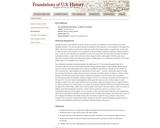
In this lesson, students will: 1. Review and understand multiple perspectives of slavery (the slaves' point of view, the abolitionist point of view and the view of the slave holder). 2. Learn three abolitionist leaders and their contribution to the movement against slavery. 3. Read and interpret primary documents having to do with the abolitionist movement. 4. Demonstrate understanding of primary documents through written assessment.

Containing more than 50 articles from the award-winning Tar Heel Junior Historian magazine and over 40 lesson plans, this multidisciplinary Educator Notebook will enrich your exploration of North Carolina and American history with diverse perspectives. This resource's link takes you to a very short form that gives you free downloadable access to the complete PDF book.

Students will learn about the roles of African Americans in Congress during Reconstruction. Through their participation in class discussion and the review of primary sources, students will explore the political climate and changes that took place during Reconstruction. Students will focus on the legislation that restricted and advanced the rights of African Americans throughout this period, examining how African American men were able to gain representation in Congress. Through creation of and participation in a group teaching activity, students will focus on the important roles these African American legislators filled. Access the PowerPoint to accompany this lesson here: https://database.civics.unc.edu/files/2012/10/AfAmUSCongressReconstructionPPT.pdf
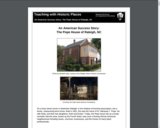
Essential Question
What was life like for a black middle class family in the early 20th century?
Objective
1. To list some of the values and objectives of the black middle class at the beginning of the 20th century;
2. To outline efforts made by Dr. Pope and other African Americans to gain civil rights in the years before the modern Civil Rights Movement of the 1950s and 1960s;
3. To identify the attributes that helped Dr. M.T. Pope succeed as an African-American entrepreneur and citizen;
4. To research how race relations shaped their community, past and present.
Background
Time Period: 1880-1920
Topics: This lesson could be used in teaching units on African-American history--including themes on segregation, the Jim Crow era, the growth of the black middle class, and the beginning of the movement for civil rights in the early 20th century.
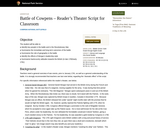
In this lesson, students will gain an understanding of the events and outcome of the Battle of Cowpens. They will also understand how the geographic features of the land played into the decision to stand and fight, as well as how those features helped the Patriots win the battle. Students will furthermore better understand the role of Daniel Morgan and how his leadership style further cemented a victory. Students will practice reading and speaking skills as well.
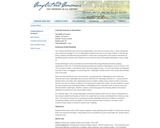
In this lesson, students will examine documents, narratives and maps to gain understanding of the significance of the battle of Trenton. By the end of this lesson, students will be able to write a BCR (single paragraph essay) explaining why the battle of Trenton was a turning point in the American Revolution, citing evidence from an eyewitness account of the battle and Thomas Paine's American Crisis.

This multimedia resource, part of the NC Science Now series, describes how researchers at the UNC Coastal Studies Institute, NOAA, and East Carolina University are studying shipwrecks of North Carolina coast. Underwater archaeologists are documenting the wrecks of allied ships and German U-boats to study and preserve in photos and videos a part of the nation's history. Components of this resource include a video and a related blog article. Links to these components are provided on the page under the heading "UNC-TV Media."

In this lesson, students will understand excerpts from an autobiographical work and retell scenes from the book. They will also collaborate to convert segments of the text into dialogue, creating a brief play about Susie King Taylor's involvement in the Civil War.
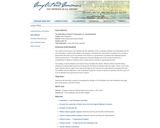
Students will determine the best way to govern by analyzing the writings of the Federalists and Anti-Federalists and apply their ideas during a Socratic Seminar.

Birth of a Colony explores the history of North Carolina from the time of European exploration through the Tuscarora War. Presented in five acts, the video combines primary sources and expert commentary to bring this period of our history to life. The accompanying teacher guides provide lesson activity ideas, vocabulary, and additional reading resources to compliment each act's theme. The 5 act themes are: First on the Land, The Road to Zacatecas, The Roanoke Voyages, A New Voyage to North Carolina, and , The Tuscarora War.

Birth of a Colony explores the history of North Carolina from the time of European exploration through the Tuscarora War. Presented in five acts, the video combines primary sources and expert commentary to bring this period of our history to life. Act III of Birth of a Colony presents the story of England?s attempts to settle in the New World. Queen Elizabeth enlisted Sir Walter Raleigh to launch an expedition ?to inhabit and possess? any lands not already claimed by Spain or France. This was part of the global power struggle between Catholic Spain and Protestant England. Queen Elizabeth believed that if England could get a foothold in America, it would be possible to cut off the flow of gold, silver, and sugar that fueled Spain?s domination and threatened England?s security. This teacher's guide contains 2 SS lessons plans: The England of the Roanoke Colonies; The Art of John White. Additional suggested resources are also included. There are optional visual arts extension activities as well. The Birth of a Colony video can be accessed at the following link: http://video.unctv.org/video/2149619983/

This collection of primary resources and corresponding activities sheds light on the endurance of peaceful protesters in Montgomery, Ala., who overturned an unjust law.

This inquiry provides students with an opportunity to explore how words affect public opinion through an examination of Harriet Beecher Stowe's novel Uncle Tom's Cabin. Students will investigate historical sources related to the novel and reactions of people in the North and South in order to address the compelling question "Can words lead to war?" The final summative assessment asks the to make an argument about the impact of the words in Uncle Tom's Cabin.
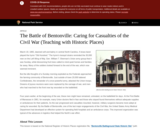
By the Battle of Bentonville, one of the last major engagements of the Civil War, the United States Army Medical Department had developed an effective system for operating field hospitals and an ambulance corps. This improved organization was typical of the advances in logistics that helped the North's war effort.
Topics: The lesson could be used in units on the Civil War. Students will strengthen their skills of observation, research, and analysis of a variety of sources.
Time period: Late 19th century
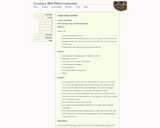
Students will develop a definition of civil war, recall the difference between the North and South which led to the South's secession from the Union, and understand the events which led to secession and the Civil War.
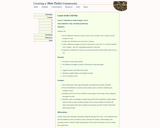
Students explain how John Brown's raid was an event that moved the South and the North closer to war. They will also review differences between a primary source and a secondary source and give several examples of each, then analyze different newspaper accounts of the raid and give two contrasting perspectives of the raid.
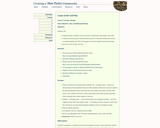
Students explain the effect Abraham Lincoln's election in 1860 had on the people of the South. They will also analyze an elctoral map of the presidential election of 1860 and conclude that Lincoln won despite getting only 40% of the popular vote and no support from the deep South.